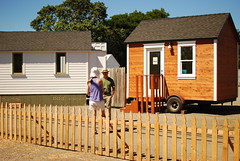Homepage
Introduction
The purpose of this web-case is to investigate the complicated issue of homelessness in Brockton, Massachusetts, and to offer complete policy and planning solutions based on fair sustainability principles. The policy/planning areas of attention include affordable housing, support services, tackling systemic disparities, and encouraging environmental sustainability and urban growth.
. My goal is to create a comprehensive plan to address homelessness in Brockton that not only takes care of the homeless population’s immediate needs but also fosters sustainability in the social, economic, and environmental spheres by incorporating lessons learned from successful models from cities like LA, Austin, and Portland, as well as from creative housing solutions like tiny housing communities and sustainable housing rights movements. How can Brockton, Massachusetts, effectively address homelessness through a holistic approach rooted in sustainability principles?
My goal is to create a comprehensive plan to address homelessness in Brockton that not only takes care of the homeless population’s immediate needs but also fosters sustainability in the social, economic, and environmental spheres by incorporating lessons learned from successful models from cities like LA, Austin, and Portland, as well as from creative housing solutions like tiny housing communities and sustainable housing rights movements. How can Brockton, Massachusetts, effectively address homelessness through a holistic approach rooted in sustainability principles?
Despite concerted efforts to address homelessness in brockton, the issue persists, with between 60% and 70% of individuals accessing shelter services experiencing temporary homelessness, often relying on support for a few months. Alarmingly, approximately 20% to 30% fall into the category of “chronically homeless,” highlighting the need for sustained intervention and tailored solutions to address their specific needs. With approximately 130 individuals seeking refuge each night, totaling around 1,000 individuals annually, the shelter (Father Bill’s & MainSpring) serves as a vital lifeline for those in need. Notably, the fastest-growing demographic seeking assistance comprises individuals aged 18 to 24, reflecting the complex challenges faced by young adults in the community.There are a totals 2 homeless shelters in Brockton that’s can be said to functioning, with homelessness population being 1000 or more that is not okay
Brockton’s Director of Social Services, Jazmine Bradsher, acknowledges that While estimates suggest between 50 and 60 individuals live on the streets long-term, the true figure remains elusive due to the transient nature of homelessness and the inherent difficulties in tracking individuals without stable housing.
Homelessness disproportionately impacts marginalized groups, such as persons of color, LGBTQ+ people, and those with disabilities. This reflects larger systemic disparities in access to housing, healthcare, education, and employment. By approaching homelessness from a justice and equity perspective, we can attempt to break down structural obstacles and create a more inclusive and equitable society in which everyone has equal chances and access to resources. Likewise, tackling homelessness in Brockton is critical for staying within ecosystem boundaries. Homelessness can have serious environmental consequences, including the spread of improvised shelters, increased trash, and strain on urban ecosystems. By providing permanent housing and support services, we may reduce these environmental impacts and promote more sustainable urban growth patterns. This includes not only meeting the urgent needs of people who are homeless but also adopting long-term solutions that prioritize environmental sustainability and resilience. Furthermore, efforts focused on job training, mental health support, and community inclusion can offer comprehensive answers to homelessness. Homelessness connects to the four requirements of fair sustainability by guaranteeing equity and justice, acknowledging cultural and economic diversity, promoting participatory governance, and addressing the quality of life and health of homeless individuals. Some tensions related to addressing homelessness include resource allocation, stigma/discrimination, Nimbyism, systemic barriers, and racism, all of which require comprehensive and inclusive approaches to overcome.
Key Themes
The key themes/issues addressed in this web-case include:
JUST Housing solutions
Provision Support Services and Resources in brockton
The importance of addressing homelessness
JUST Sustainability housing in Urban communities
https://www.communityhomelesssolutions.org
